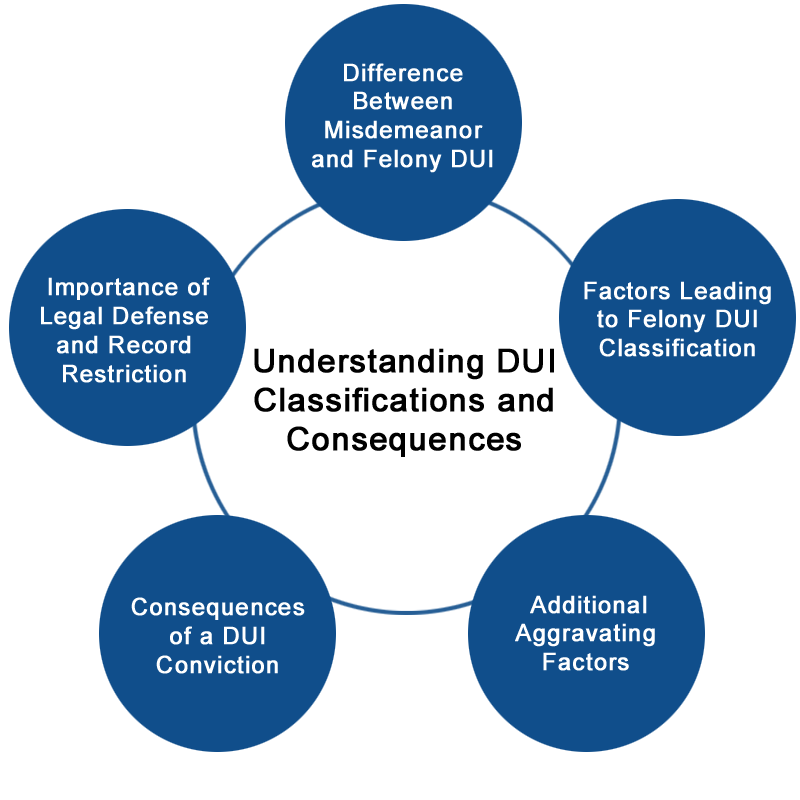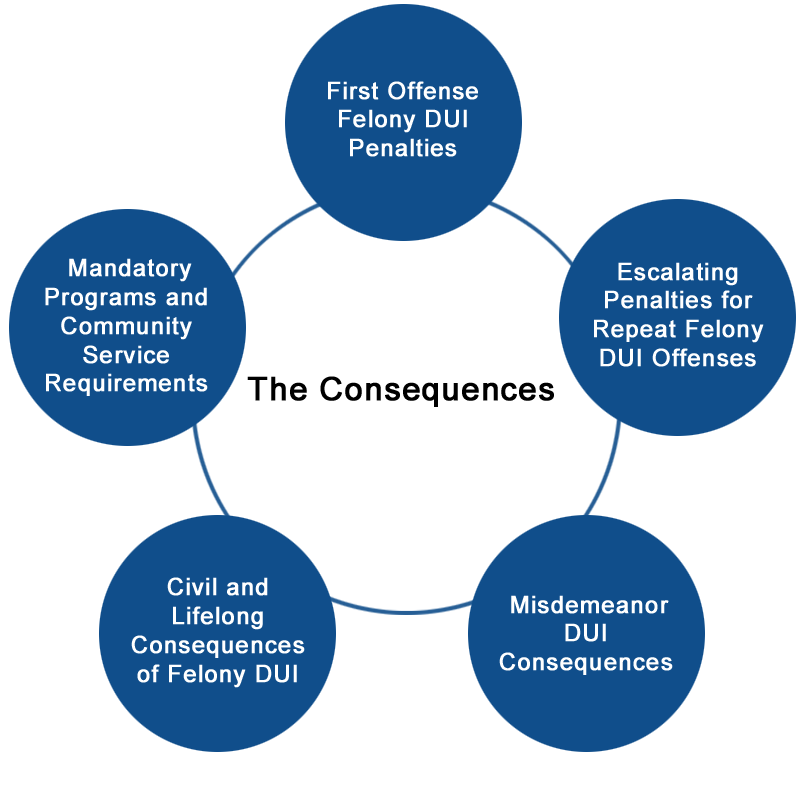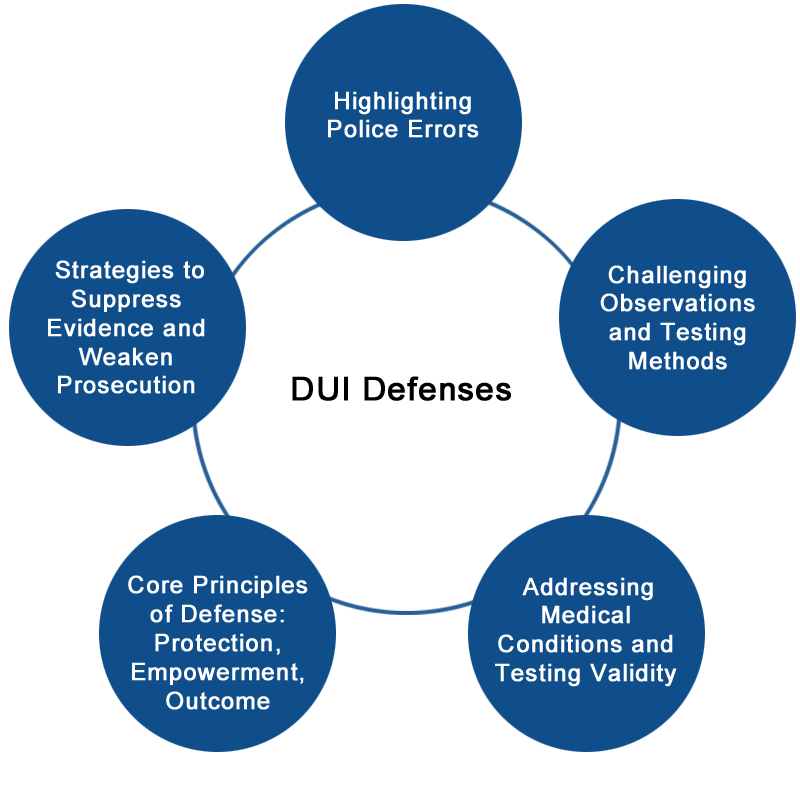
Under Georgia law, a DUI can either be classified as a misdemeanor or as a felony. A misdemeanor DUI is generally a first offense – or in some cases a second or third where no serious harm was done to others – and carries fewer consequences than a felony DUI. This means that license suspension, fines, potential jail time and community service will all be less severe than they would be for a felony, while still increasing with each repeat offense.
A felony conviction of DUI is reserved for major offenses, and carries far greater consequences including higher fines, longer prison sentences and potential loss of driving privileges. Plus, having a felony conviction on a permanent criminal record can severely impact employment opportunities and civil rights such as voting or carrying a firearm.
There are several factors that can lead to a classification of felony DUI under Georgia law, including:
- Repeat Offense: The State of Georgia considers a fourth DUI within a lookback period of 10 years to be an automatic felony. This lookback is based on the arrest date, not the conviction date.
- Serious Injury or Death: In cases where the driver was found to be intoxicated following an accident that caused serious injury or death, the charges will be elevated to a felony. They may also be accompanied by charges of vehicular homicide or serious injury by vehicle, which carry their own penalties.
There are also factors that, while they don’t necessarily lead to an automatic felony charge, can lead to increased penalties for a conviction. These include:
- Child Endangerment: Driving under the influence while traveling with a child under 14 can not only increase penalties, but it can also lead to separate charges.
- High Blood or Breath Results: While the legal limit for blood alcohol content (BAC) is .08%, a BAC level of .15% or higher can severely increase penalties, especially in cases that aren’t a first offense.
A felony classification is a serious charge, carrying with it not only devastating short-term consequences, but potentially life-long ramifications. A conviction is a permanent feature on your criminal record, leading to difficulties securing employment, education or housing; loss of voting rights or First Amendment rights; plus the long-term social stigma of being a convicted felon.
Even a conviction on a misdemeanor DUI is a permanent part of your criminal record, as Georgia law prohibits conditional discharge or the expunging, deferring or diverting of convictions. While not as serious as having a felony conviction on your record, this can still have long-term consequences.
This is why it is so important that you challenge the case against you in the hopes of having the charges dismissed, acquitted or reduced. If you are successful, you could be eligible for a record restriction which would keep the charges invisible from public view. The first step is to contact an attorney immediately who can help you understand your options, create potential defenses, and work to get charges reduced.

The Consequences
Below you’ll find a few of the consequences a person faces when charged with felony DUI. Naturally, the specifics of the case will have a large impact on sentencing, but these are general guidelines proscribed by Georgia law.
First Offense Felony DUI
Consequences include a year or more in prison with a 90-day minimum, up to $5,000 in fines, plus extended or typically permanent loss of driving privileges. Beyond that, courts will likely require mandatory completion of drug or alcohol treatment programs and Victim Impact Panels (VIPs), plus hundreds of hours of community service and extended probation.
Second Offense Felony DUI
For a second offense, jail time can go as high as five years, fines can range from $2,000-$5,000, and loss of driving privileges will be extended if not completely repealed. Community service and probation times will be extended, and in addition to intense treatment programs and VIPS the court may require those convicted to attend further rehabilitative programs.
Third Offense Felony DUI
With a third offense, the law requires harsher penalties including a prison term of 5-10 years, fines ranging from $3,000-$10,000, and permanent loss of driving privileges. In addition to the mandatory treatment programs, VIPs and rehabilitative programs that come with a felony DUI conviction, a third offense leads to a probation length of up to 10 years and up to 1,000 hours of community service.
Fourth Offense Felony DUI
A fourth offense carries incredibly harsh penalties, including 10-15 years in prison, fines potentially exceeding $10,000, and permanent license revocation. Those convicted will be required to attend drug or alcohol treatment, VIPs, and further rehabilitative programs plus serve the maximum number of community service hours possible and submit to potential lifetime probation.
In addition to the consequences outlined above, as a felony, each conviction carries a permanent loss of civil rights along with a slate of lifelong consequences. Contrast the consequences seen above with the consequences for misdemeanor DUI:
First Offense Misdemeanor DUI
A first conviction for misdemeanor DUI will generally carry jail time of as little as 24 hours and as long as a year, depending on various factors including BAC. Fines run from $300-$1,000, probation can last up to a year, and driving privileges can be suspended for up to a year, although a limited permit is available after 120 days. Those convicted will be required to attend a DUI Risk Reduction Program (aka DUI School) plus a VIP, as well as serve 40 hours of community service (for BAC below .08%) or up to 60 hours (for .08 or above).
Second Offense Misdemeanor DUI
For second convictions, jail time increases to a minimum of 72 hours and up to a year if within 5 years of the previous conviction. In addition, fines increase to the $600-$1,000 range, license suspension is increased to up to three years with restricted permit possible after 18 months, and probation increases to a year. Along with the same programs required for a first-offense conviction, a second conviction carries 240 hours of community service and the potential installation of an Ignition Interlock Device (IID) for up to six months.
Third Offense
For a third offense, jail times increase to a range between 120 days and a year, fines increase to the $1,000-$5,000 range, and license revocation can be extended up to five years, with a limited permit available after two years. Along with the installation of an IID, mandatory treatment programs and VIPS, a year of probation and 240 hours of community service, a third conviction leads to a “habitual violation” label if all three occurred within five years. This label carries its own restrictions and penalties.
Fourth Offense
Considered a felony, a fourth offense carries the same consequences as a first-offense felony as outlined above.
With all of these convictions, although not as serious as felony convictions, you can expect to carry the criminal record of the act for life.

Defending Against DUI Charges
There are numerous ways to defend against DUI accusations, whether misdemeanor or felony-level charges. Among our successful strategies, we’ve helped clients achieve the best outcomes by:
Highlighting Police Errors: Law enforcement officers make mistakes all the time, whether it be failing to prove probable cause, not following procedure, or mishandling evidence. These mistakes create an opportunity to file motions that suppress evidence, weakening the prosecution’s case.
Questioning Observations or Testing: Much of the evidence against someone in a DUI case comes from the officer’s own observations, which can be subjective. For example, if an officer notes that the defendant had red eyes or was unsteady, those “signs of impairment” can be the result of anything from road conditions to poor lighting or adverse weather. Even objective tests can be unreliable due to improper calibration or usage of equipment.
Suggesting Influence of Medical Conditions: Certain medical conditions such as Gastroesophageal reflux disease (GERD), diabetes or acid reflux can create chemical compounds in the breath that cause false positives on a breathalyzer. In the same vein, medical conditions ranging from general anxiety to neurological disorders or even simple balance issues can skew field sobriety results. Introducing these conditions weakens the validity of testing done on the scene.
At Zeliff | Watson, we build a robust defense on our three core principles: Protection, Empowerment, and Achieving the Best Possible Outcome. When we talk about protection, we mean defending you through exhaustive research that identifies and exposes every weakness in the case against you. When we talk about empowerment, we mean educating you on the law and the case against you so you become an active participant in your defense. By achieving the best possible outcome, we mean just that: reducing the consequences you face and giving you back control of your life.
A Simple Process to Getting Started

Schedule a Free Case Evaluation
Schedule a free, no-obligation, and confidential case consultation in person, online, or over the phone. This will help you understand how your case can be challenged, potentially leading to a reduction, dismissal, or acquittal of your charges. Click here to schedule your case evaluation.

Meet Our Defense Team and Conduct a Case Evaluation
During your free case evaluation, you’ll have the opportunity to ask questions, receive answers and legal guidance, and collaborate with our attorneys to better understand your side of the story, gather evidence, and devise a strategy to achieve the best possible outcome for your pending criminal charges.

Start Defending Your Case
After your free case evaluation, Zeliff & Watson will assist in preserving evidence and safeguarding your rights, ensuring your protection throughout the process. The defense team will also provide a proposed fee to represent your case, with the goal of achieving the best possible outcome.

